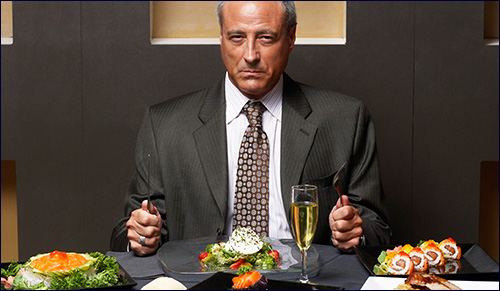 Vampire Weekend's Surprising Jewish Stories
Vampire Weekend's Surprising Jewish Stories


4 min read
3 min read
7 min read
3 min read
When you are living to eat.
“Please join us for Shabbos dinner,” my husband said to one of his students. “We would really love to have you as our guests.”
“I’m afraid we can’t,” responded the invitee. “My wife and I are foodies and I’m afraid the food won’t be good enough.”
No one could make this up. My husband was dumbfounded – and speechless (which for a rabbi is a very unusual condition!).
This person’s manners (or obvious lack thereof) speak for themselves. But what about his values? What led him to believe that this would be an appropriate response? And why is he proud to define himself as a “foodie”? In Jewish life, we frequently discuss the question “are you living to eat or eating to live?” Although many of us may behave like we’re living to eat, our saner self recognizes that it should be the opposite.
And even though I like to cook, I like to eat, I like to share recipes and I even co-founded a cooking website, I do not consider myself a foodie. I want to share recipes so I can create a good meal for my family (and the guests who accept our invitations!) but I don’t have a lot to say about it. “It tastes good.” “It was easy” (a big plus in my books!). “Here’s how you make it” or “Can I have that recipe please?” That sums it up for me.
If I’m invited out, I certainly enjoy the food if my hostess is a good cook, but I’m happy to be with friends and have a meaningful conversation however dry the chicken and uninspired the sides!
It’s true that food is a big part of every Jewish holiday (you know the old joke that ends with “Let’s eat”) but we are meant to elevate it. Food is the tool to help us connect our bodies to the holiday and ultimately connect our celebration to the Almighty. Food is the means not the end.
It can be a wonderful means. All the delicious colors and tastes and flavors and spices are meant to increase our awe of the world the Almighty has created and deepen our gratitude. They are not meant to be an obsession – or lead to constant criticism and nit-picking – the very opposite of a grateful way of being. We are not rushing to the table like the dogs in the Purina Dog Chow commercial but approaching eating in a dignified manner as befits a human being who identifies with his soul over his body.
When someone doesn’t want to be friends with our children, many of us comfort them by saying “It’s their loss.” That’s what I told myself about my husband’s student. But it’s not their loss because the food without a doubt would have been delicious (!), but because their attitude limits their enjoyment of life and their development as human beings. And it certainly limits their ability to connect to their Creator. It’s their loss because they are living to eat and, ultimately, that’s not enough to sustain us (no pun intended).
